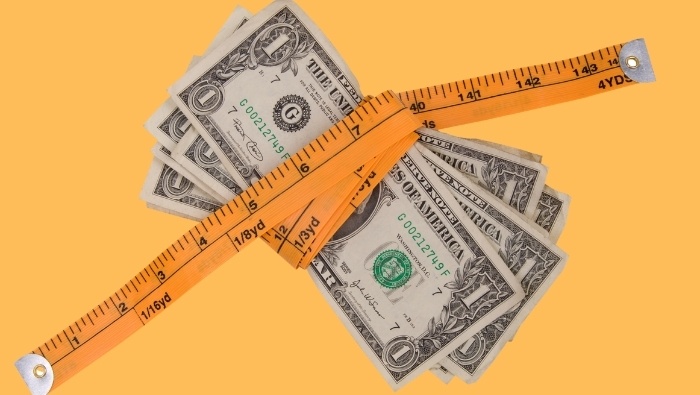Put Yourself on a Financial Diet
by Jan Roland

Many of the same lifestyle-changing tips that help you lose weight can also help you improve your financial situation. Try these tips to put yourself on a financial diet.
Have you ever gone on a diet to lose weight or improve your health? If not, you’ve known someone who has.
One thing that becomes obvious after any attempt (whether successful or not) to lose weight is that fad diets don’t have a lasting effect. Only a diet that changes your lifestyle will keep the weight off long-term. The key is a change in eating habits.
Many of these same lifestyle-changing tips can be used to help anyone who needs to put themselves on a financial diet due to a change in their financial situation. A financial diet is also helpful for people who simply want to save more money for the future.
Educate Yourself
Part of a successful weight loss program is assessing your current eating habits and evaluating possible diet changes that will melt the excess pounds. You educate yourself about calories and carbohydrates. You explore new healthy foods and recipes. You find new ways to satisfy your hunger.
The same is true when you go on a financial diet. Look at your current money habits. Consider possible changes that will save you money. Decide which expenses are really necessary and which just add to the financial fat. (See Simple Habits That Make a Financial Difference.)
Recognize, too, that you’re not just looking for big changes. Sure, it’d be great if you could find them. But, quite often, losing weight happens pound by pound over a long time. The same is true of your money. A change might only save you a dollar or two a day, but it does add up over time.
Sign Up for Savings
Subscribe to get money-saving content by email that can help you stretch your dollars further.
Twice each week, you'll receive articles and tips that can help you free up and keep more of your hard-earned money, even on the tightest of budgets.
We respect your privacy. Unsubscribe at any time.
Motivation
If you want to change your lifestyle, you’ll need to keep motivated. Often, that requires encouragement and milestones along the way. Many weight loss programs encourage you to keep track of your weight or even report it to others on a regular basis.
Suppose your goal is to pay off a credit card balance of $10,000. That’s not done overnight. Charting your progress and watching the balance go down can encourage you. Giving yourself a small reward as each $1,000 of debt is eliminated helps to keep you motivated to achieve your goal.
Avoid a Feeling of Deprivation
When you’re dieting, it’s easy to feel like you’re missing out on all the good things in life – pizza, cake, ice cream, etc. That you’re making a major sacrifice to achieve your goal. The same thing can happen when you’re on a financial diet.
You drive by your favorite coffee shop and think about that latte you used to get. You feel deprived. You begin to wonder if reaching your goal is really that important.
One way to avoid a feeling of deprivation is to replace it with a different thought. Why not think of what it’ll be like to achieve your financial goal? Tape a postcard of the vacation destination you’re saving for to your dashboard. Or a chart of your declining credit card balance on your bathroom mirror. Any reminder of your goal will do.
Discipline
Achieving a long-term goal requires discipline. You’re attempting to replace a long-time bad habit with ones that are good for your finances.
Often, a bad habit can be broken more easily if you replace it with a good one. Want to lose weight? Instead of having ice cream every evening, have a healthy smoothie instead. You can do the same thing with your finances. Instead of surfing the web looking for online shopping bargains, search the web for interesting historical facts and people. Or use your tablet or phone to learn a foreign language.
Support and Accountability
Any lifestyle change is made easier when you have friends and family to support you. Making a change can be challenging. Both physically and emotionally. A friendly voice to encourage you can make the rough spots easier to navigate.
It can be especially good if that person has experience achieving a goal similar to yours. Explorers often hire a guide who has been down the path before to warn them of dangers along the way. An experienced friend who has undertaken a financial diet will understand what you’re feeling and can share how they managed to be successful.
It can also be helpful to have someone close to you hold you accountable. Someone that you’ll answer to on a regular basis. No one likes to admit that they failed. Often, when tempted to throw your financial diet aside, the thought of facing your friend will be enough to resist the temptation to cheat.
Be Hopeful
Many people have lost weight by changing their lifestyle. And many others have changed their financial future with a money makeover. You, too, can lose excess financial weight and be a new you!
Reviewed January 2024
Sign Up for Savings
Subscribe to get money-saving content by email that can help you stretch your dollars further.
Twice each week, you'll receive articles and tips that can help you free up and keep more of your hard-earned money, even on the tightest of budgets.
We respect your privacy. Unsubscribe at any time.
Popular Articles
On After50Finances.com
- 9 Things You Need to Do Before You Retire
- You Didn’t Save Enough for Retirement and You’re 55+
- When Empty Nesters Reorganize and Declutter Their Home
- Reinventing Your Career in Your 50s or 60s
- What Mature Homeowners Should Know about Reverse Mortgages
- 2 Reasons to Collect Social Security Benefits As Soon As Possible


